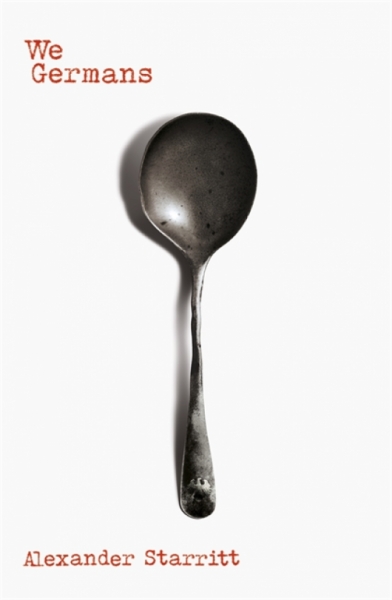We Germans
By Alexander Starritt

Blurb
When a young British man asks his German grandfather what it was like to fight on the wrong side of the war, the question is initially met with irritation and silence. But after the old man's death, a long letter to his grandson is found among his things.
That letter is this book. In it, he relates the experiences of an unlikely few days on the Eastern Front - at a moment when he knows not only that Germany is going to lose the war, but that it deserves to. He writes about his everyday experience amid horror, confusion and great bravery, and he asks himself what responsibility he bears for the circumstances he found himself in. As he tries to find an answer he can live with, we hear from his grandson what kind of man he became in the seventy years after the war.
We Germans is a fundamentally human novel that grapples with the most profound of questions about guilt, shame and responsibility - questions that remain as live today as they have always been.
Our Review
We Germans tackles the question of collective guilt and how far individual accountability goes when acting on the orders of your superiors.
We Germans is written in the style of a letter written from a grandfather to his grandson about his experiences on the Eastern front during the latter part of WW2. Interspersed are chapters written from the perspective of his grandson telling the reader about the man he knew his grandfather to be.
“So, as to the question of his goodness or otherwise as a man, you know the caveat: I’m his grandson and I loved him. And yet he fought for the Nazis. Wore the uniform, killed people. Did the things he talks about here. I loved him so much I ask myself whether I would have forgiven him anything. Probably not anything, though it makes me sad just to say that.”
His grandson also talks about the shame and guilt still felt by those of German heritage when the subject of WW2 comes up, despite being several generations removed. He suggests this was behind his focus on that particular aspect of his grandfather’s life rather than the significant achievements he made later.
I found We Germans brilliant and horrifying in equal measure. Some of the things discussed in the book are discussed in a graphic way and those carried out by an otherwise likeable protagonist are more shocking for that fact.
At the start of his letter the grandfather makes it clear that he wasn’t a Nazi, he was a member of the German army. A member of the army who knew before the end of the war that not only were they going to lose the war but that was the right outcome.
“Later on, when I flicked back through them, I began to see shameful pattern in the way we were conducting the campaign. I started to realise that we did not hold the high ground, far from it.”
The letter to his grandson addresses some painful truths but also contains some heartfelt moments. For example, any mention of his wife.
“She is the fixed centre around which everything else moves, even now that she’s dead. And I would not want to live two hundred years without her.”
Another passage I found particularly moving was this:
“I don’t remember any of it except her – her eyes that I’d already known for more than half my life, and how happy she was.
That mattered to me, matters to me now, more than anything: more than the war, more than anything I do or didn’t do, more than the question of what kind of man I am. That may not be a moral answer, but it’s the truth.”
He clearly feels regret so some of his actions and shame for those perpetrated by others of which he was aware.
“We did it first, and worse. In war, the mechanism of justice is retribution. Woe to the conquered. And justice was performed in aggregate, not for individuals. Each of us thinks, I didn’t set up the Nazi party, I didn’t deliver people to the camps. But we did.”
“Can you be culpable for something you weren’t in control of?” and “can you do real evil without meaning to?” You tell me.
Our Final Rating...
Read & Shared 54 Times.



Get In Touch
Please feel free to leave a comment to this book review below. Or even leave your own review if you like.
If you run a blog and/or have posted a review to this book, a Q & A or general author interview online you can always add a trackback to it here and following moderation we'll add a link to it below.